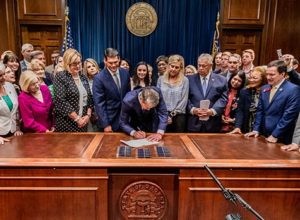Southern Baptist leaders in Georgia were jubilant after Gov. Brian Kemp on Tuesday signed one of the nation’s most restrictive abortion laws.
The bill, certain to be challenged in court, bans abortions if a fetal heartbeat can be detected. That can be as early as six weeks, when many women don’t yet know they are pregnant.
Mike Griffin, public affairs representative for the Georgia Baptist Convention, hailed the bill’s passage in comments quoted by the Christian Index.

Georgia Governor Brian Kemp signs the LIFE Act.
“There is no doubt in my mind that this is the most meaningful and impactful piece of legislation passed in my 12 years of lobbying at the Georgia State Capitol,” said Griffin, pastor of Liberty Baptist Church of Hartwell, Georgia. “As Georgia Baptists we know that this legislation reflects our values as a denomination regarding the biblical standard that all life is valuable because it is created in the image of God and is worthy of protection under our constitution.”
Thomas Hammond, executive director of the 3,400-church affiliate of the Southern Baptist Convention, called on Georgia Baptists to answer critics who say the law will increase the number of unwanted children.
“It’s one thing for us to tell a pregnant woman to not have an abortion,” Hammond told the newspaper. “It’s another for us to step up beside her and help. There needs to be a greater emphasis on us engaging in foster care, adoption, and similar aspects of our society to be impacted by this law.”
Georgia is the fourth state this year to pass a law banning abortions when a fetal heartbeat is detected. At least 15 states have introduced similar measures.
With conservative Supreme Court appointments by President Trump, some abortion opponents are eager to challenge Roe v. Wade, the 1973 landmark ruling recognizing abortion early in pregnancy as a constitutional right. Others fear the strategy could backfire. Catholic bishops in Tennessee recently opposed a heartbeat bill, advocating a more pragmatic approach of supporting bills with a better chance of being upheld in courts.
“We must remember that every pro-abortion victory in the courts further strengthens the Roe v. Wade precedent and makes Roe that much more difficult to overturn,” the bishops said in February. “Furthermore, states that defend their own ‘Heartbeat Bills’ must pay attorney’s fees to Planned Parenthood when Planned Parenthood sues that state and wins in court.”
Southern Baptists in Oklahoma voiced similar concern in opposing a state law protecting human life “from the moment of fertilization upon the fusion of a human spermatozoon with a human ovum.”
“There are more proven and plausible life-saving policies Oklahoma could enact en route to ending the tragic practice of abortion, while simultaneously offering support and help for abortion-vulnerable mothers,” Baptist General Convention of Oklahoma leaders said in an open letter in February.
